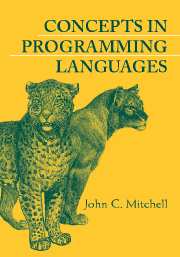Book contents
- Frontmatter
- Contents
- Preface
- Part 1 Functions and Foundations
- Part 2 Procedures, Types, Memory Management, and Control
- 5 The Algol Family and ML
- 6 Type Systems and Type Inference
- 7 Scope, Functions, and Storage Management
- 8 Control in Sequential Languages
- Part 3 Modularity, Abstraction, and Object-Oriented Programming
- Part 4 Concurrency and Logic Programming
- Appendix A Additional Program Examples
- Glossary
- Index
5 - The Algol Family and ML
from Part 2 - Procedures, Types, Memory Management, and Control
Published online by Cambridge University Press: 05 June 2012
- Frontmatter
- Contents
- Preface
- Part 1 Functions and Foundations
- Part 2 Procedures, Types, Memory Management, and Control
- 5 The Algol Family and ML
- 6 Type Systems and Type Inference
- 7 Scope, Functions, and Storage Management
- 8 Control in Sequential Languages
- Part 3 Modularity, Abstraction, and Object-Oriented Programming
- Part 4 Concurrency and Logic Programming
- Appendix A Additional Program Examples
- Glossary
- Index
Summary
The Algol-like programming languages evolved in parallel with the Lisp family of languages, beginning with Algol 58 and Algol 60 in the late 1950s. The most prominent Algol-like programming languages are Pascal and C, although C differs from most of the Algol-like languages in some significant ways.
In this chapter, we look at some of the historically important languages from the Algol family, including Algol 60, Pascal, and C. Because many of the central features of the Algol family are used in ML, we then use the ML programming language to discuss some important concepts in more detail. The ML section of this chapter is also a useful reference for later chapters that use ML examples to illustrate concepts that are not found in C.
There are many Algol-related languages that we do not have time to cover, such as Algol 58, Algol W, Euclid, EL1, Mesa, Modula-2, Oberon, and Modula-3. We will discuss Modula and modules in Chapter 9.
THE ALGOL FAMILY OF PROGRAMMING LANGUAGES
A number of important language ideas were developed in the Algol family, which began with work on Algol 58 and Algol 60 in the late 1950s. The Algol family developed in parallel with Lisp languages and led to the late development of ML and Modula.
The main characteristics of the Algol family are the familiar colon-separated sequence of statements used in most languages today, block structure, functions and procedures, and static typing.
- Type
- Chapter
- Information
- Concepts in Programming Languages , pp. 93 - 128Publisher: Cambridge University PressPrint publication year: 2002



